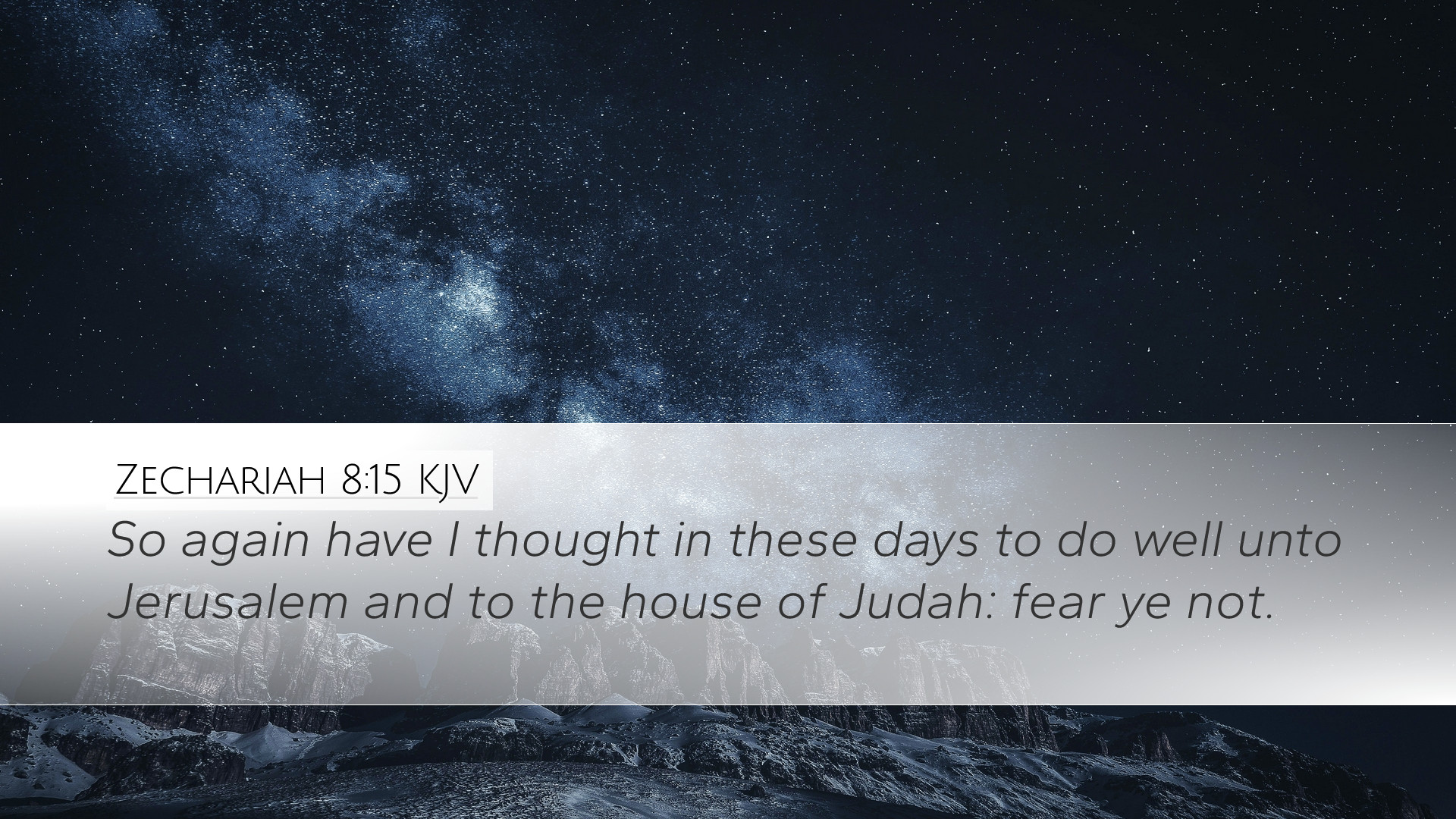Commentary on Zechariah 8:15
Bible Verse: “So again have I thought in these days to do well unto Jerusalem and to the house of Judah: fear ye not.” (Zechariah 8:15)
Introduction
This verse resides within the broader context of Zechariah’s prophetic messages, where the Lord reassures His people of their restoration after the Babylonian exile. The chapter signifies a turning point, emphasizing hope, divine favor, and the promise of prosperity for Jerusalem and Judah.
Contextual Background
The book of Zechariah, part of the Minor Prophets, emerges during a period when the Israelites are returning from exile. This return to Jerusalem marks a critical moment in Jewish history, as it signals the re-establishment of worship and communal life centered around the Temple. Zechariah's prophecies are aimed at encouraging the people during the rebuilding process, emphasizing God's unwavering promise and benevolence.
Verse Analysis
In Zechariah 8:15, we see a reaffirmation of God’s intent to bless His people. The phrase “so again have I thought” indicates a consistent divine resolve and reflects God’s ongoing commitment to His covenant.
Theological Insights
- Divine Intent: The phrase suggests that God's thoughts and actions are consistent with His nature. His desire to do well signifies His mercy and grace (Matthew Henry).
- Fear Ye Not: The affirmation “fear ye not” serves as a gentle command against anxiety. The presence of fear often hinders faith, but God invites His people to trust in His plans (Albert Barnes).
Commentary Excerpts
Matthew Henry: Henry emphasizes the restoration themes in this chapter, noting that God’s thoughts towards His people are always to prosper them. He encourages believers to recognize that God is always at work for their good, regardless of circumstances.
Albert Barnes: Barnes asserts that God’s intentions are always benevolent, aimed at both the individual and collective. He elucidates that the verse builds confidence in God’s providential care and encourages the faithful to move forward without fear.
Adam Clarke: Clarke expands on the importance of behavior towards God during difficult times, noting that the acknowledgment of God’s goodness should evoke trust rather than fear. He reflects on how Isaiah 41:10 parallels this call to not be afraid, asserting that God accompanies His people in every endeavor.
Implications for Pastors and Theologians
For pastors, this verse serves as a declaration of the optimism inherent in the Christian faith. It provides a powerful reminder that God’s plans always include restoration and blessing, even when circumstances might suggest otherwise. The comforting injunction to not fear can be employed in sermons and counseling settings to uplift congregations facing challenges.
Practical Applications
- Trust in Divine Providence: Encouraging believers to trust in God’s goodness and plans, especially in times of uncertainty.
- Overcoming Fear: Providing practical teachings on how to combat fear through faith in God’s promises.
- Community Restoration: Utilizing this verse to inspire efforts of community building in church settings, affirming that God cares for His people collectively and individually.
Conclusion
Zechariah 8:15 encapsulates the heart of God towards His people as one of compassion, faithfulness, and encouragement. By reflecting on insights from esteemed commentators, we grasp a more profound understanding of God’s unwavering promise to bless His people, even in times of struggle. Proper application of this scripture can provide hope, instill courage, and animate the vision for restoration and community flourishing in faith.


